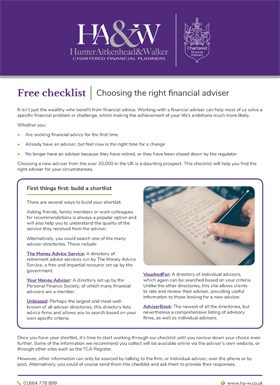It isn’t just the wealthy who benefit from financial advice. Working with a financial adviser can help most of us solve a specific financial problem or challenge, whilst making the achievement of your life’s ambitions much more likely.
Whether you:
- Are seeking financial advice for the first time
- Already have an adviser, but feel now is the right time for a change
- No longer have an adviser because they have retired, or they have been closed down by the regulator
Choosing a new adviser from the over 30,000 in the UK is a daunting prospect. This checklist will help you find the right adviser for your circumstances.
First things first: build a shortlist
There are several ways to build your shortlist.
Asking friends, family members or work colleagues for recommendations is always a popular option and will also help you to understand the quality of the service they received from the adviser.
Alternatively, you could search one of the many adviser directories. These include:
The Money Advice Service: A directory of retirement advice services run by The Money Advice Service, a free and impartial resource set up by the government.
Your Money Adviser: A directory set up by the Personal Finance Society, of which many financial advisers are a member.
Unbiased: Perhaps the largest and most well-known of all adviser directories, this directory lists advice firms and allows you to search based on your own specific criteria.
VouchedFor: A directory of individual advisers, which again can be searched based on your criteria. Unlike the other directories, this site allows clients to rate and review their adviser, providing useful information to those looking for a new adviser.
AdviserBook: The newest of all the directories, but nevertheless a comprehensive listing of advisory firms, as well as individual advisers.
Once you have your shortlist, it’s time to start working through our checklist until you narrow down your choice even further. Some of the information we recommend you collect will be available online via the adviser’s own website, or through other sites such as the FCA Register.
However, other information can only be sourced by talking to the firm, or individual adviser, over the phone or by post. Alternatively, you could of course send them this checklist and ask them to provide their responses.



